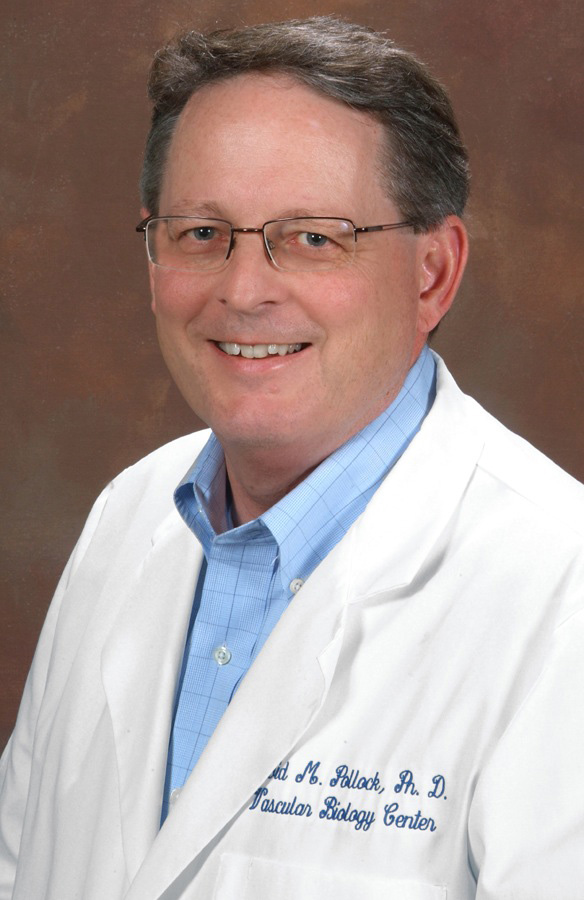David Pollock, Ph.D., and Jennifer Pollock, Ph.D., whose work with endothelial cells lining blood vessels in the kidney has helped explain its role in controlling sodium balance, will create and lead the new section of Translational Cardio-Renal Research. The Pollocks have been on faculty at Georgia Regents University in Augusta since 1995; David is Regents professor and chief of the Section of Experimental Medicine and Jennifer is Weiss professor in the section and director of the University System of Georgia M.D./Ph.D. Program.
 |
| David Pollock, Ph.D. |
Their recruitment is part of the School of Medicine’s AMC 21 strategic plan to recruit highly performing faculty in strategic areas.
The Pollocks will transfer about $10 million in current research funding to UAB. David’s work is funded by two NIH program project grants (“Stress related mechanisms of hypertensive risk” and “Endothelin control of renal hemodynamic and excretory function”), and a recently awarded project cooperative agreement grant (U01) to study the role of endothelin in sickle cell disease. Jennifer is a project leader on the P01 grants, co-investigator on the U01 grant and also is principal investigator of a pending R01 grant to study how behavioral hardships in early life contribute to endothelial dysfunction in later life.
The move to UAB was driven by UAB’s collaborative environment, Jennifer Pollock says. “It really came down to the opportunities at UAB to move our science and collaborations in a much more translational direction,” she said. “The opportunities at UAB are amazing. We did our homework; the reputation of the highly collaborative work environment with scientists, basic or clinical, was an opportunity we could not pass up.”
David Pollock, the president-elect of the American Physiological Society, says he was aware of UAB’s reputation in nephrology and hypertension research when he was a graduate student. “The clinical faculty really understand and appreciate the value of basic science and research,” he said. “There is confidence in the leadership, and walls between disciplines are very low, which is rare. The ability to work with the clinical and translational faculty at a larger institution is really appealing.”
 |
| Jennifer Pollock, Ph.D. |
“The Pollocks’ research program will complement the ongoing work in the Section of Vascular Biology and Hypertension in the Division of Cardiovascular Disease, by incorporating renal underpinnings and mechanisms of disease,” said Sumanth Prabhu, M.D., director of the Division of Cardiovascular Disease. “We envision a fruitful working collaboration with the newly formed Section of Cardio-Renal Research in the Division of Nephrology that will open new translational perspectives on the pathophysiology and management of vascular disease.”
“I am thrilled to welcome the Pollocks to UAB and the Department of Medicine,” said Seth Landefeld, M.D., chair of that department. “They bring an engaging collaborative spirit and a tremendously creative approach to science. I am deeply grateful to Anupam Agarwal for leading their recruitment and to Sumanth Prabhu for his support of their program as a bridge between our Divisions of Nephrology and Cardiology.”
The Pollocks credit the leadership at UAB for creating an environment that will be symbiotic. “It was very exciting to learn how we could fit into their machine and make it better. To know that we could help move UAB to the next level, with a shared vision, we were impressed with that,” Jennifer Pollock said.
Working with clinical faculty in cardiology and nephrology will propel their basic science, David Pollock said. “We’ve been able to show in the last 10 to 15 years how important endothelin is in controlling sodium balance in normal physiology. I want to know whether all these mechanisms that we’ve been exploring in animal models is true in humans,” he said.
The Pollocks are also pursuing developmental programming, the concept that behavioral stressors produce biological or physiological responses. Mouse pups who were separated from their mothers for short periods of time in the first two weeks of life later developed dysfunction in their blood vessels, specifically in the nitric oxide pathway, Jennifer Pollock said. “They’re more prone to disease and are at greater risk of vascular disease. We’re looking at the mechanisms behind that, and whether it can happen over generations. This could be another part of a complex picture of how cardiovascular disease is rampant world-wide.”
David and Jennifer each have undergraduate degrees from the University of Evansville. David received his Ph.D. in physiology from the University of Cincinnati, then went to the University of North Carolina at Chapel Hill for post-doc work with Dr. Carl Gottschalk and William Arendshorst. Jennifer earned a master’s degree from Cincinnati and earned her Ph.D. from UNC. David worked for Abbott Labs from 1989 to 1995. Jennifer was a research associate at Children’s Hospital in Boston for a year, was a post-doc for Nobel laureate Ferid Murad, M.D., Ph.D., at Abbott Labs for two years and stayed at Abbott until 1995, when the couple went to Georgia.
The couple has three adult children: Michaela, a management student at Georgia College; Sam, a graduate student in health care management at the Medical University of South Carolina; and Luke, a recent mechanical engineering graduate from Georgia Tech.